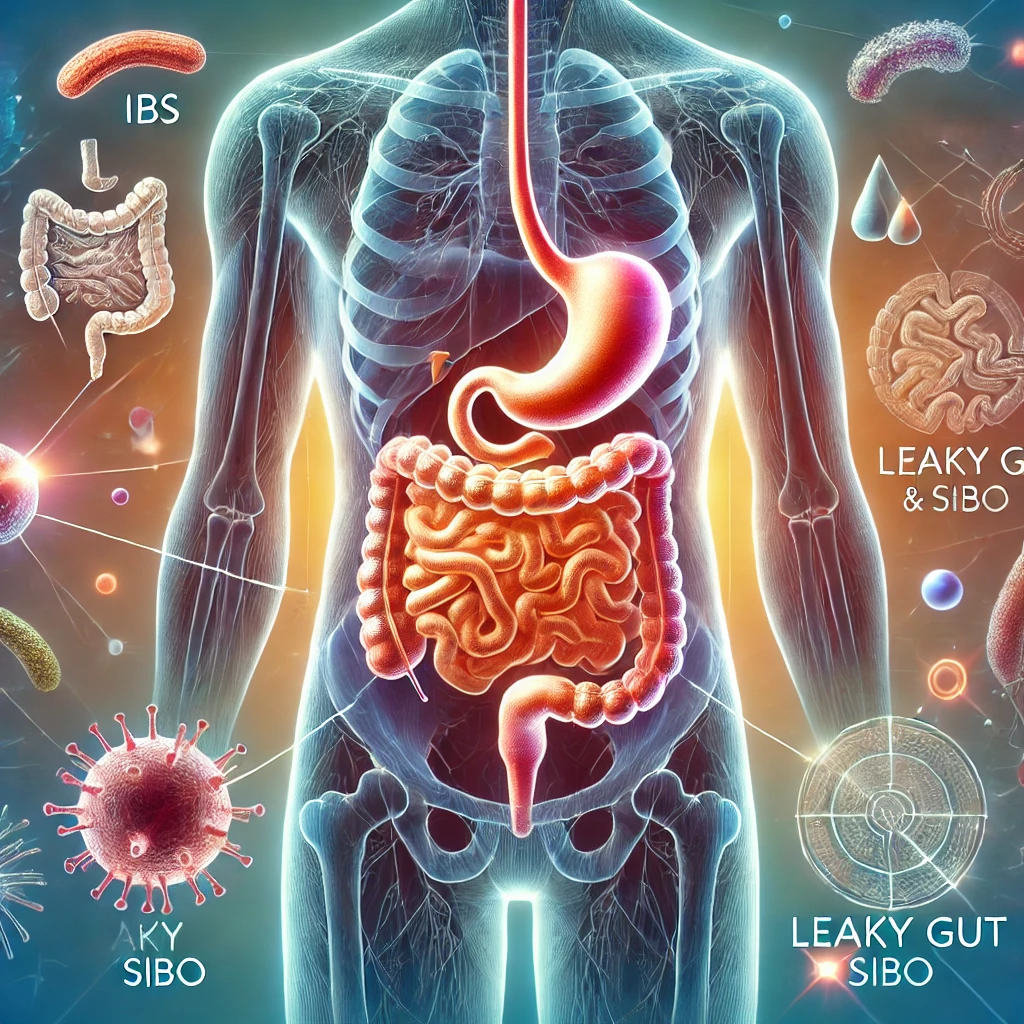Transforming Digestive Health: Best Functional Medicine Protocols for IBS, Leaky Gut, and SIBO

Are you struggling with digestive issues like Irritable Bowel Syndrome (IBS), Leaky Gut, or Small Intestine Bacterial Overgrowth (SIBO)? You’re not alone. Millions of people suffer from these conditions, and finding lasting relief can feel like searching for a needle in a haystack.
During my tenth grade year, as I was preparing for medical school entrance exams, my digestive issues became unbearable. Despite receiving excellent medical care and managing most symptoms with five year-round prescriptions and countless over-the-counter remedies, I never really did Get Better.
The turning point came when I visited a chiropractor for a stiff neck and discovered a more natural approach to health. This included natural pain management, a better diet, the importance of sleep (as an insomniac), and drug-free stress management. Ultimately, I chose to pursue chiropractic school over advanced placement at Johns Hopkins—a decision that may seem crazy to almost everyone.
However, the lasting relief I found in alternative medicine, which functional medicine now encompasses, was something conventional medicine couldn’t provide. Fast forward 40 years, and I’ve developed protocols that have helped many people reclaim their digestive health and their lives, just as I did. Let’s dive into the best functional medicine protocols for these common yet debilitating conditions.
Understanding IBS, Leaky Gut, and SIBO

Before we explore the protocols, it’s crucial to understand what these conditions entail.
IBS (Irritable Bowel Syndrome)
IBS is a chronic condition that affects the large intestine, causing symptoms like cramping, abdominal pain, bloating, gas, diarrhea, and constipation. It’s a functional gastrointestinal disorder, meaning it relates to problems with how the gut and brain work together.
Leaky Gut
Leaky Gut, or increased intestinal permeability, occurs when the lining of the small intestine gets damaged. This damage allows undigested food particles, toxins, and bacteria to “leak” through the intestines and flood the bloodstream, leading to inflammation and a potential immune system reaction.
SIBO (Small Intestine Bacterial Overgrowth)
SIBO happens when there is an abnormal increase in the overall bacterial population in the small intestine, particularly types of bacteria not commonly found in that part of the digestive tract. This overgrowth can lead to pain, bloating, diarrhea, and malnutrition.
The Functional Medicine Approach

Functional medicine addresses the root causes of disease, aiming for holistic healing rather than merely managing symptoms. Let’s look at the best protocols for IBS, Leaky Gut, and SIBO.
1. Comprehensive Diagnostic Testing
The first step in any functional medicine protocol is comprehensive diagnostic testing. Tests may include:
- Stool Analysis: To check for parasites, imbalances in gut flora, and digestive function.
- Breath Tests: To detect SIBO.
- Food Sensitivity Testing: To identify potential food triggers.
- Blood Tests: To check for nutrient deficiencies and markers of inflammation.
2. Diet and Nutrition
Diet is foundational in managing and healing IBS, Leaky Gut, and SIBO.
IBS Protocol
- Low FODMAP Diet: This diet eliminates foods that are fermentable oligo-, di-, mono-saccharides and polyols. These short-chain carbohydrates are poorly absorbed in the small intestine and can trigger IBS symptoms.
- High-Fiber Diet: Soluble fiber, found in oats, fruits, and vegetables, can help manage constipation-predominant IBS.
- Elimination Diet: Identify and remove food triggers like gluten, dairy, and certain vegetables.
Leaky Gut Protocol
- Anti-Inflammatory Diet: Focus on foods that reduce inflammation, such as fatty fish, leafy greens, nuts, and seeds.
- Gluten-Free Diet: Gluten can exacerbate leaky gut, so eliminating it can help heal the gut lining.
- Bone Broth and Collagen: These can help repair the gut lining due to their high amino acid content.
SIBO Protocol
- Specific Carbohydrate Diet (SCD) or Low FODMAP Diet: These diets starve the bacteria in the small intestine by removing fermentable carbohydrates.
- Elemental Diet: A liquid diet that is fully absorbed in the upper digestive tract, depriving bacteria in the small intestine of food.
- Intermittent Fasting: Gives the gut time to rest and can reduce bacterial overgrowth.
3. Targeted Supplements
Supplements can play a crucial role in healing and managing these conditions.
IBS Protocol
- Probiotics: Specific strains like Bifidobacterium infantis can help restore gut flora balance.
- Peppermint Oil: Known for its antispasmodic properties, it can reduce IBS symptoms.
- Digestive Enzymes: Aid in breaking down food and reducing symptoms.
Leaky Gut Protocol
- L-Glutamine: An amino acid that helps repair the gut lining.
- Zinc Carnosine: Supports gut healing and reduces inflammation.
- Probiotics and Prebiotics: Help restore healthy gut flora.
SIBO Protocol
- Herbal Antibiotics: Berberine, oregano oil, and allicin (garlic) can help reduce bacterial overgrowth.
- Prokinetics: Medications or supplements that enhance gut motility, (magnesium) preventing bacterial stasis.
- Probiotics: Specifically targeted strains that survive the small intestine environment.
4. Lifestyle Modifications

Lifestyle changes are essential for long-term management and healing. So much so, that without this key factor, anything else is overpriced aspirin.
Stress Management
Stress can exacerbate all three conditions. Techniques like mindfulness meditation, Tai-chi, yoga, and deep breathing exercises can significantly reduce symptoms.
Regular Exercise
Moderate exercise helps maintain healthy gut motility and reduces stress levels.
Adequate Sleep
Ensure you get 7-9 hours of quality sleep per night to support overall health and gut healing.
5. Addressing Underlying Infections and Imbalances
Functional medicine practitioners often find that underlying infections (like Candida or parasites) and hormonal imbalances (like thyroid dysfunction) can contribute to digestive disorders. Addressing these through appropriate protocols is crucial for comprehensive healing.
Case Studies
Case Study 1: IBS Success
Jane, a 35-year-old female, suffered from IBS for over a decade. After comprehensive testing, she was found to have multiple food sensitivities and dysbiosis. By following a low FODMAP diet, taking targeted probiotics, and incorporating stress management techniques, Jane experienced a 90% reduction in symptoms within six months.
Case Study 2: Healing Leaky Gut
Mark, a 40-year-old male, presented with chronic fatigue, joint pain, and digestive issues. Testing revealed a leaky gut and gluten sensitivity. An anti-inflammatory diet, supplements like L-Glutamine and zinc carnosine, and eliminating gluten led to significant improvement. Mark reported feeling more energetic and pain-free within three months.
Case Study 3: Overcoming SIBO
Sarah, a 28-year-old female, had recurrent SIBO despite multiple rounds of antibiotics. A functional medicine approach using the elemental diet, herbal antibiotics, and prokinetics, along with a maintenance low FODMAP diet, led to lasting relief. Follow-up tests showed no signs of SIBO after six months.
Key Takeaways
IBS, Leaky Gut, and SIBO can be challenging to manage, but functional medicine offers effective strategies that go beyond symptom relief. Comprehensive testing, tailored diets, specific supplements, and lifestyle changes form the cornerstone of these protocols. By focusing on the underlying causes, functional medicine can help you achieve lasting relief and a healthier, more vibrant life.
If you’re struggling with any of these conditions, consider consulting with a certified functional medicine practitioner to develop a personalized plan. Remember, healing is a journey, and with the right protocols, you can reclaim your digestive health and live your best life.
Frequently Asked Questions (FAQs)

Q: How long does it take to see improvements with functional medicine protocols? A: The timeline for improvements can vary depending on the severity of the condition and individual differences. Some people may start to feel better within a few weeks, while for others, it may take several months of consistent effort.
Q: Can I do these protocols on my own, or do I need a practitioner? A: While you can start with general recommendations, working with a functional medicine practitioner ensures that the protocols are tailored to your specific needs and underlying conditions, which can significantly enhance the effectiveness of the treatment.
Q: Are there any side effects to these protocols? A: Generally, these protocols use natural approaches, so side effects are minimal. However, individual reactions can vary, and it’s important to monitor your body’s response and adjust the protocols as needed.
Q: Can these protocols cure IBS, Leaky Gut, and SIBO permanently? A: Functional medicine aims to address the root causes and bring about long-term relief. While some people may experience complete resolution of symptoms, others might need ongoing management to maintain gut health.
Q: How do I know which diet is right for me? A: Comprehensive testing and working with a practitioner can help determine the most effective dietary approach for your specific condition and individual needs.
By embracing functional medicine protocols, you’re taking a proactive step towards holistic health and well-being. Remember, your journey to healing starts with understanding and addressing the root causes of your condition. Let’s embark on this journey together and achieve lasting relief and optimal health.
When It’s More Important… Get BetteRx
Take control of your health and experience the difference personalized care can make. Schedule your consultation with Dr. P and start living your best life!
Call to Schedule
661-753-9340
Statements not evaluated by FDA.
Not intended to diagnose, treat, cure, or prevent any disease.
